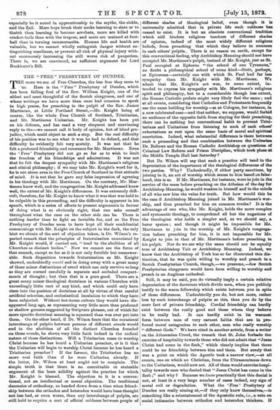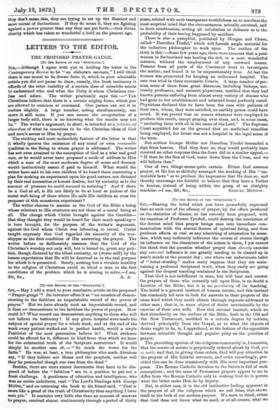THE "FREE" PRESBYTERY OF DUNDEE.
THE more we see of Free Churches, the less free they seem to us. Here is the " Free " Presbytery of Dundee, which has been falling foul of the Rev. William Knight, one of the ablest and most thoughtful of the Scotch clergymen, and one of whose writings we have more than once had occasion to speak in high praise, for preaching in the pulpit of the Rev. James Martineau, at Little Portland Street,—Mr. Knight being of course, like the whole Free Church of Scotland, Trinitarian, and Mr. Martineau Unitarian. Mr. Knight has been put on his defence, and has read a very eloquent and convincing reply to the—we cannot call it body of opinion, but of blind pre- judice, which could object to each a step. But the real difficulty of his position was to see what it was he had to defend, and that difficulty he evidently felt very acutely. It was not that he felt a profound friendship and reverence for Mr. Martineau. Even the 'Free' Presbytery did not go so far as to wish to limit the freedom of his friendships and admiratione. It was not that he felt the deepest sympathy with Mr. Martineau's religious awl ethical philosophy; if we may take Mr. Knight's word for it, he is not alone even in the Free Church of Scotland in that attitude of mind. It is not that he gave any false impression of agreeing in his theology with Mr. Martineau. On the contrary, Mr. Mar- tineau knew well and the congregation Mr. Knight addressed knew well, the extent of Mr. Knight's differences. It was extremely diffi- cult, therefore, for Mr. Knight to know what it was that was held to be culpable in this proceeding, and the difficulty is apparent in his speech, which is a series of efforts to present arguments in favour of doing what is so obviously right, that one asks oneself throughout what the case on the other side can be. There is nothing harder than to fight an invisible foe, and as the Free Presbytery of Dundee seem to have kept all their confidential communings with Mr. Knight on the subject in the dark, the only hint we obtain of the sort of objection taken, is Dr. Wilson's re- ported remark that the principles of fraternisation enunciated by Mr. Knight would, if carried out, "tend -to the abolition of all Churches as distinct bodies." Now we cannot see the force of that remark, except so far as it is not only forcible but unanswer- able. Such disposition towards fraternisation as Mr. Knight showed, undoubtedly would end in doing away with a great many of those minor distinctions of creed which can only survive so long as they are nursed carefully in separate and secluded compart- ments of thought ; but then that is a pure good. There are a great many minor theological doctrines in various Churches with exceedingly little root of any kind, and which could only have risen into the position of doctrines at all by virtue of that careful artificial selection, and ecclesiastical insulation to which they have been subjected. Without hot-house culture they would have dis- appeared long ago, as representing very little more than profound or shallow guesses suggested by Scripture phrases, out of which far snore specific doctrinal meaning is squeezed than was ever put into them. On the other hand, if Dr. Wilson fears that the occasional interchange of pulpits between persons of different creeds would end in the abolition of all the distinct Churches founded on those creeds, he shows very little faith indeed in the radical nature of those distinctions. Will a Trinitarian cease to worship Christ because he has heard a Unitarian preacher, or is it that the Unitarian will begin to worship Christ because he has heard a Trinitarian preacher? If the former, the Trinitarian has no more real faith than if he were Unitarian already. If the latter, Dr. Wilson at least ought not to complain. The simple truth is that there is no conceivable or stateable argument of the least solidity against the practice for which Mr. Knight is blamed. The objection to it is a conven- tional, not an intellectual or moral objection. The traditional decencies of orthodoxy, as handed down from a time when friend- ship between the orthodox and heterodox would have been thought not less bad, or even worse, than any interchange of pulpits, are still held to require a sort of official coldness between people of
different shades of theological belief, even though it is universally admitted that in private life such coldness has ceased to exist. It is but an obsolete conventional tradition which still hinders religious teachers of different shades of opinion, indeed of the most widely different religions beliefs, from preaching that which they believe in common in each others' pulpits.. There is no reason on earth, except for this conventional feeling, why Archbishop Manning should not have occupied Mr. Martineau's pulpit, instead of Mr. Knight, just as Se. Paul occupied at Ephesus "the school of one Tyrannua," no doubt a philosophical school of some kind—Stoic, perhaps, or Epicurean—certainly one with which St. Paul had far less sympathy than Mr. Knight with Mr. Martineau. We admit that Mr. Knight's act was, to some extent, in- tended to express his sympathy with Mr. Martineau's religious spirit and philosophy, but to a considerable though leas extent, the Roman Catholic prelate might very likely feel the same ; and at all events, considering that Catholics and Protestants frequently use the same building for worship—as at Cologne, for instance, in a now celebrated case—and that neither, we suppose, would forbid an audience of the opposite faith from staying for their preaching, there can be nothing but conventional habit to prevent Trini- tarians and Unitarians from listening to such of each others' exhortations as rest upon the same basis of moral and spiritual conviction. Indeed, what substantial difference is there between such a proceeding and that combination between the Unitarian Dr. Bellows and the Roman Catholic Archbishop on questions of Criminal Law Reform and Prison Discipline, which took place-at the Middle Temple Hall last Saturday?
But Dr. Wilson will say that such a practice will tend to the depreciation of the importance of the theological differences of the two parties. Why? Undoubtedly, if either party sanctions, by joining in it, an act of worship which seems to him based on false- hood, this is so. If Mr. Martineau, for instance, were to join in the service of the mass before preaching on the Atheism of the day for Archbishop Manning, he would weaken in himself and in the minds of all who saw him the value for truth. Bat how would this be the case if Archbishop Manning joined in Mr. Martineau's wor- ship, and then preached for him on common truths? It is the advantage of one who, like Mr. Knight, holds the more complex and systematic theology, to comprehend all but the negations of the theologian who holds a simpler and, as we should say, a barer system ; and though it might be impossible for Mr. Martineau to join in the worship of Mr. Knight's congrega- tion before preaching for him, it is not impossible for Mr. Knight to join in that of Mr. Martineau's before preaching in his pulpit. Nor do we see why the same should not be equally true of Archbishop Tait or Archbishop Manning. Indeed, we know that the Archbishop of York has so far illustrated this dis- tinction, that he was quite willing to worship and preach in a Scotch Presbyterian Church, though,—we presume,—few Seotch Presbyterian clergymen would have been willing to worship and preach in an Anglican cathedral.
Still, it may be said, you do virtually imply a certain relative depreciation of the doctrines which divide men, when you publicly testify to the warm fellowship which exists between you in spite of these differences. Undoubtedly you do, but not more, rather less by such interchange of pulpits as this, than you do by the mere fact of private friendship. Cordial friendship can hardly exist between the really good and those whom they believe to be really bad. It can hardly exist in its warmest form between men of very earnest faiths tliat are in pro- found moral antagonism to each other, men who really worship "different Gods." We have cited in another article, from a writer on the Athanasian Creed, the remark that St. John forbade the exercise of hospitality towards those who did not admit that "Jesus Christ had come in the flesh," which clearly implies that there could be no friendship between him and them. Bat surely that was a point on which the Apostle took a narrow view,—at all events, one on which no Christian, from the Ultramontanes down to the Unitarians, would now act. All of them would exercise hospi- tality towards men who denied that "Jesus Christ has come in the flesh ;" and why ? Because we know practically that this denial is not, at least in a very large number of cases indeed, any sign of moral evil or degradation. What the 'Free' Presbytery of Dundee are really aiming at,—if they only knew themselves,--is something like a reinstatement of the &postolic rule, i.e., a veto on social intimacies between orthodox and heterodox thinkers. If
they don't mean this, they are trying to set up the flimsiest and most unreal of distinctions. If they do mean it, they are fighting against a power greater than any they can put forth,—that divine charity which has taken so wonderful a hold on the present age.



































 Previous page
Previous page